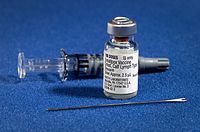
Photo from wikipedia
New influenza strains are constantly emerging, causing seasonal epidemics and raising concerns to the risk of a new global pandemic. Since vaccination is an effective method to prevent the spread… Click to show full abstract
New influenza strains are constantly emerging, causing seasonal epidemics and raising concerns to the risk of a new global pandemic. Since vaccination is an effective method to prevent the spread of the disease and reduce its severity, the development of robust bioprocesses for producing pandemic influenza vaccines is exceptionally important. Herein, a membrane chromatography-based downstream processing platform with a demonstrated industrial application potential was established. Cell culture-derived influenza virus H1N1/A/PR/8/34 was harvested from benchtop bioreactor cultures. For the clarification of the cell culture broth, a depth filtration was selected as an alternative to centrifugation. After inactivation, an anion exchange chromatography membrane was used for viral capture and further processing. Additionally, two pandemic influenza virus strains, the H7N9 subtype of the A/Anhui/1/2013 and H3N2/A/Hong Kong/8/64, were successfully processed through similar downstream process steps establishing optimized process parameters. Overall, 41.3–62.5% viral recovery was achieved, with the removal of 86.3–96.5% host cell DNA and 95.5–99.7% of proteins. The proposed membrane chromatography purification is a scalable and generic method for the processing of different influenza strains and is a promising alternative to the current industrial purification of influenza vaccines based on ultracentrifugation methodologies.
Journal Title: Vaccines
Year Published: 2022
Link to full text (if available)
Share on Social Media: Sign Up to like & get
recommendations!